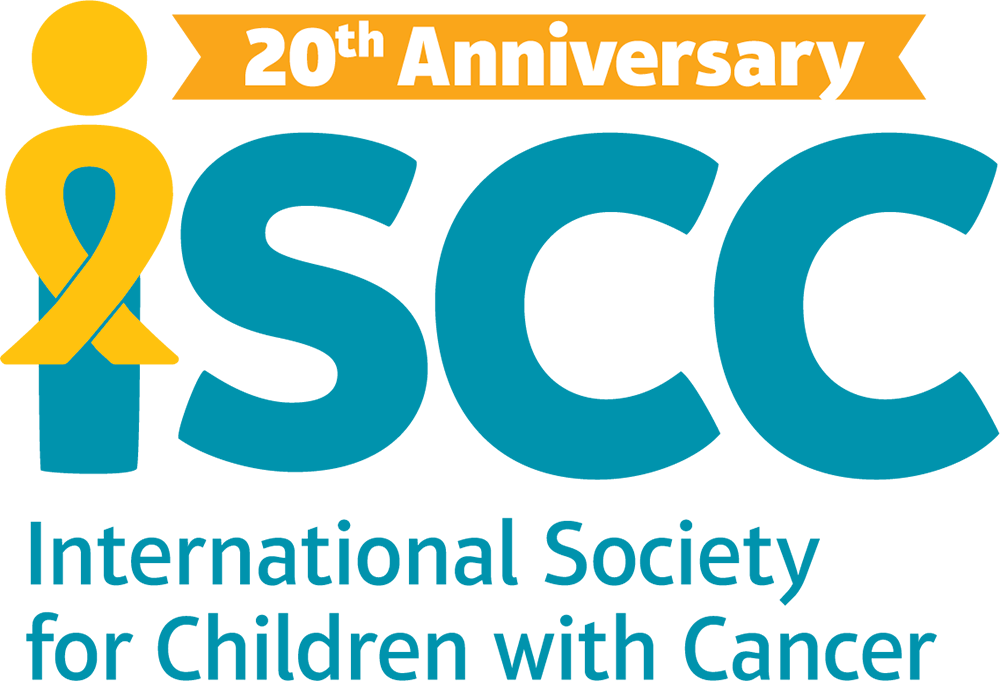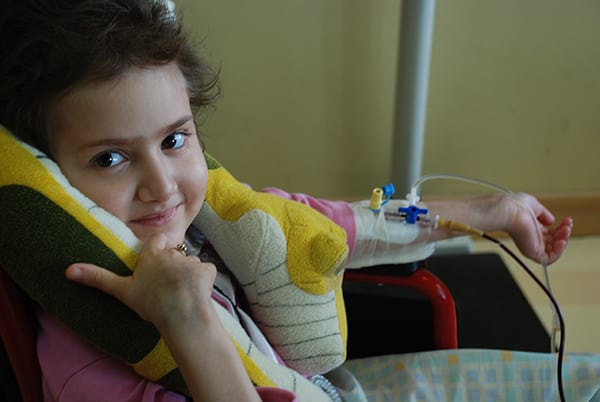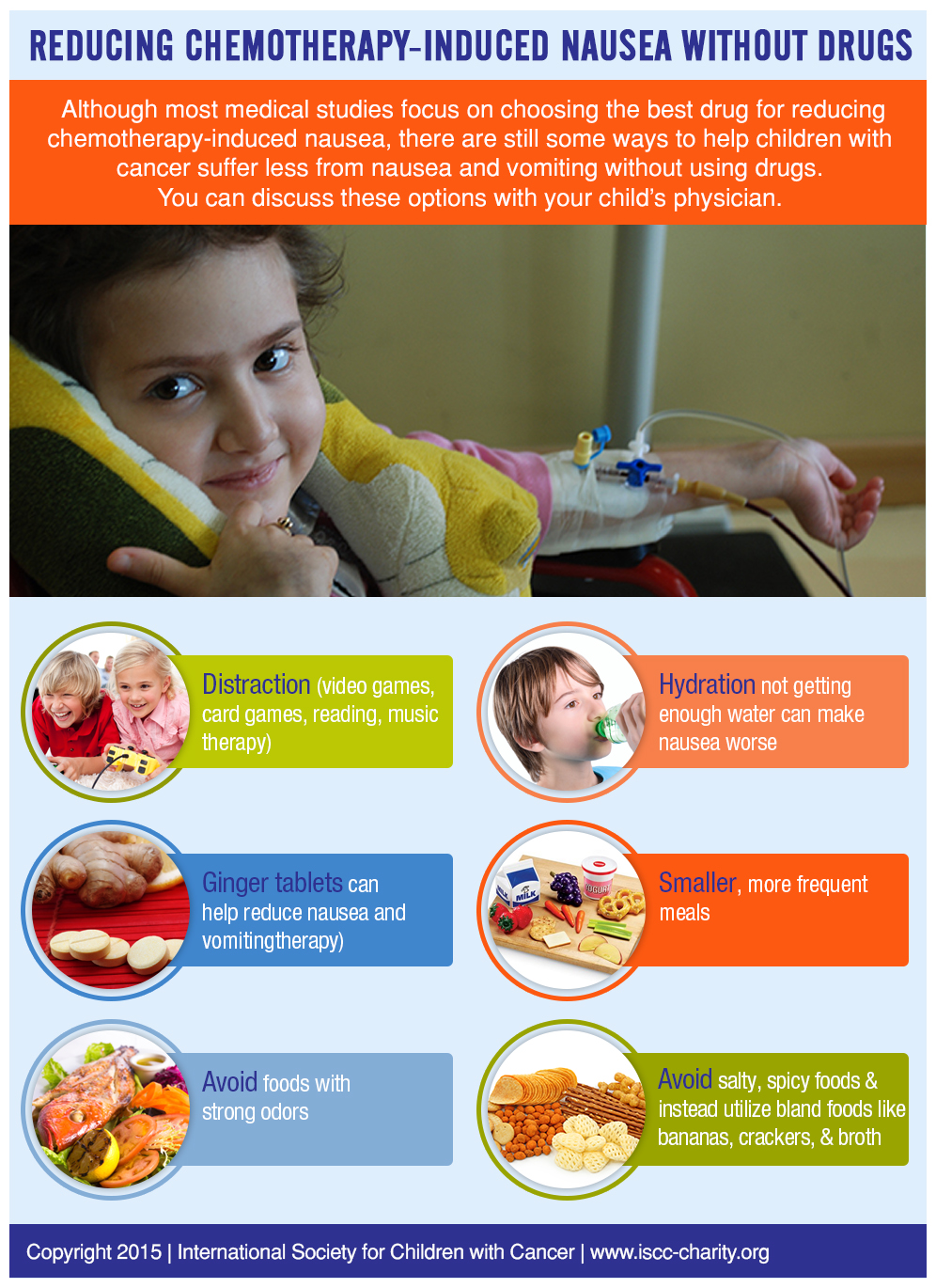Nausea is the feeling of needing to throw up, while vomiting is the act of throwing up ingested food with the pressure of abdominal muscles. Chemotherapy-induced nausea and vomiting (CINV) is the feeling of nauseous or the act of vomiting due to the physical and psychological effects of chemotherapy drugs.
CINV is categorized into 3 groups:
- Anticipatory: Feeling nauseous before the chemotherapy session starts due to previous bad memories from the procedure. This could be stimulated by the smell of the treatment room.
- Acute: Nausea and vomiting within 24 hours of the chemotherapy session.
- Delayed phase CINV: Nausea and vomiting that starts the day after chemotherapy, which can last up to 6-7 days.
Although most medical studies focus on choosing the best drug for reducing CINV [1, 2], there are still some ways to help children with cancer suffer less from nausea and vomiting without using drugs. You can discuss these options with your child's physician:
- Cognitive distracting:
Playing video games during a chemotherapy session could be a safe way to distract your child and help reduce nausea. - Dietary interventions:
- Prepare smaller, but more frequent meals for your child. Tell him/her to eat and drink slowly.
- Reduce food aromas, especially the ones with strong odors. Offer foods like crackers, rice, and toast.
- Avoid spicy, fatty, or salty foods. Some good food choices are: soup, broth, banana, yogurt, and pasta.
- Give prescribed antiemetic drugs (for reducing nausea) to your child prior to the chemotherapy session, so the effect will last during and after the session.
- Prepare whichever food previously helped your child with nausea on the chemotherapy day. If your child prefers not to eat before the treatment starts or eat just a little amount, let him/her do it. Wait one hour after the treatment before letting your child eat or drink.
- Ginger tablets:
Ginger may help with nausea and vomiting. A study on children with bone sarcoma (a kind of bone cancer) showed that 334 mg or 800 mg tablets of ginger, one hour before and three and eight hours after the chemotherapy, could help reduce the children's nausea and vomiting [3]. Make sure to consult your child’s physician on the recommended dietary allowance and dosages before starting a supplement for your child. - Avoid dehydration:
Dehydration means the body is not getting enough water, which can worsen nausea. Make sure your child drinks enough water to avoid this condition [4]. - Exercise:
Exercise could help with reducing CINV. Make sure to consult your child's physician to find out about the best exercise options and the allowed activities for your child [5]. - Acupuncture:
Insertion of wire-thin needles into certain parts of the body (acupoints) along a specific meridian by a specialist may be helpful in some cases. - Acupressure:
Application of pressure to acupoints digitally (like a massage), or with some devices by a specialist could help reduce nausea in some children. - Hypnosis:
This is a process in which a therapist guides the child to use his/her imagination to feel safe and well. It could be done both before and after the chemotherapy session and usually lasts for 15-45 minutes [6-8]. - Music therapy:
Playing your child's favorite music for 45 minutes and repeating it every several hours during the chemotherapy session could help reduce nausea [9].
The above list is not a substitute for medical advice or treatment. Always consult with your physician regarding any medical condition.
Refrences
- Roila, F., et al., Guideline update for MASCC and ESMO in the prevention of chemotherapy- and radiotherapy-induced nausea and vomiting: results of the Perugia consensus conference. Ann Oncol, 2010. 21 Suppl 5: p. v232-43.
- Sung, L., et al., Children's Oncology Group's 2013 blueprint for research: cancer control and supportive care. Pediatr Blood Cancer, 2013. 60(6): p. 1027-30.
- Pillai, A.K., et al., Anti-emetic effect of ginger powder versus placebo as an add-on therapy in children and young adults receiving high emetogenic chemotherapy. Pediatr Blood Cancer, 2011. 56(2): p. 234-8.
- www.uptodate.com.
- Dupuis, L.L., et al., Guideline for the prevention of acute nausea and vomiting due to antineoplastic medication in pediatric cancer patients. Pediatr Blood Cancer, 2013. 60(7): p. 1073-82.
- Jacknow, D.S., et al., Hypnosis in the prevention of chemotherapy-related nausea and vomiting in children: a prospective study. J Dev Behav Pediatr, 1994. 15(4): p. 258-64.
- Zeltzer, L.K., et al., A randomized, controlled study of behavioral intervention for chemotherapy distress in children with cancer. Pediatrics, 1991. 88(1): p. 34-42.
- Lotfi-Jam, K., et al., Nonpharmacologic strategies for managing common chemotherapy adverse effects: a systematic review. J Clin Oncol, 2008. 26(34): p. 5618-29.
- Ezzone, S., et al., Music as an adjunct to antiemetic therapy. Oncol Nurs Forum, 1998. 25(9): p. 1551-6.


